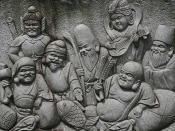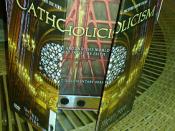On the face of it, Dr. Faustus is not an anti-Catholic play. Yet, once you have read into it certain aspects of the play - there are many anti-Catholic notions and views that Marlowe has placed within the text. If the reader has no prior knowledge of how the world was in the Sixteenth century, then they would probably not uncover Marlowe's hidden messages. There are many issues dealt with in the play, yet, they all follow a route to anti-Catholicism. All of the ideas dealt with are reminiscent of the period that Marlowe is writing in, when people did have quite 'humanist' views and were hostile towards the Catholic Church because of the lies that they had been telling. The main theme of anti-Catholicism is Dr. Faustus' rejection of God. For a sixteenth century audience to watch someone reject God and sell their soul to the devil is the most anti-religious thing that they could do.
They most probably would have been petrified of what the consequences of his actions would be. Yet, at the same time, would most probably have admired his courage to stand against an establishment that had ruled their entire lives by preaching falsehoods and in effect stealing from them (through the sales of 'indulgences'). Also, right from the beginning when we are introduced to Faustus, we find him in Wittenberg - the same place in which the monk Martin Luther lived - an anti-catholic statement in itself as Luther himself opposed the Catholic regime. I believe Marlowe has intentionally set the play in Wittenberg to make a statement right from the beginning that this play is set out to make anti-Catholic notions. The play deals with sin and damnation at the heart of Christianity's understanding of the world. The play shows us that Faustus'...


